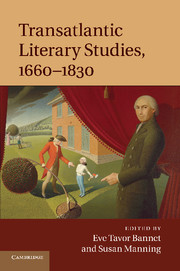Book contents
- Frontmatter
- Contents
- Notes on contributors
- Acknowledgements
- Introduction: British and American genres
- Chapter 1 Transatlantic books and literary culture
- Chapter 2 Transatlantic utopianism and the writing of America
- Chapter 3 Tales of wonder, spiritual autobiographies, and providence tales
- Chapter 4 Life writings
- Chapter 5 Benjamin Franklin and transatlantic literary journalism
- Chapter 6 Theatre, drama, performance
- Chapter 7 Transatlantic American Indians
- Chapter 8 Literature of the ocean
- Chapter 9 “To gird this watery globe”
- Chapter 10 Ghostly and vernacular presences in the black Atlantic
- Chapter 11 Susanna Rowson and the transatlantic captivity narrative
- Chapter 12 Domestic fiction and the reprint trade
- Chapter 13 Transatlantic Gothic
- Chapter 14 Transatlantic Romanticisms
- Chapter 15 Journeys of the imagination in Wheatley and Coleridge
- Chapter 16 Transatlantic historical fiction
- Further reading
- Index
- References
Chapter 15 - Journeys of the imagination in Wheatley and Coleridge
Published online by Cambridge University Press: 05 January 2012
- Frontmatter
- Contents
- Notes on contributors
- Acknowledgements
- Introduction: British and American genres
- Chapter 1 Transatlantic books and literary culture
- Chapter 2 Transatlantic utopianism and the writing of America
- Chapter 3 Tales of wonder, spiritual autobiographies, and providence tales
- Chapter 4 Life writings
- Chapter 5 Benjamin Franklin and transatlantic literary journalism
- Chapter 6 Theatre, drama, performance
- Chapter 7 Transatlantic American Indians
- Chapter 8 Literature of the ocean
- Chapter 9 “To gird this watery globe”
- Chapter 10 Ghostly and vernacular presences in the black Atlantic
- Chapter 11 Susanna Rowson and the transatlantic captivity narrative
- Chapter 12 Domestic fiction and the reprint trade
- Chapter 13 Transatlantic Gothic
- Chapter 14 Transatlantic Romanticisms
- Chapter 15 Journeys of the imagination in Wheatley and Coleridge
- Chapter 16 Transatlantic historical fiction
- Further reading
- Index
- References
Summary
Transatlantic Literary and Cultural Relationships
Twentieth-century scholarship typically provides rationales and vocabulary for separating literature by nation, ethnicity, and period. As scholars begin to study Romanticism as an Atlantic-rim phenomenon, it becomes logical to replace Romanticism with transatlantic romanticisms, the lowercase r and the added s indicating the pluralism of the period's literary and cultural productions. When considered from a transatlantic perspective, the capital R of “Romanticism” fragments into seven Rs, which overlap to give the period more of an ideological grounding: Race, Reason, Reflexivity, Reform, Religion, Representation, and Revolution. Accounting for race, particularly the slave trade, during an age of colonialism is a necessary but complex endeavor. Writers of the time sought to justify as well as protest and eradicate slavery as they crossed national, physical, and mental borders in thought, word, and action. These cultural and national border crossings transform “Romanticism” into transnational movements concerned with human rights, the self, beauty, Nature, divinity, imagination, and transcendence.
Many transatlantic romantic texts represent the “Imagination” metaphorically by a ship's transoceanic voyage, movement from one opinion or position to its polar opposite across an interstitial body of water. Such texts exemplify “Imag-I-Nation(s),” a term that denotes how writers embroider the representation of self to achieve reform through metaphors that cross waters, realms, nations, and borders (both physical and imagined). In “The Rime of the Ancient Mariner,” for example, Samuel Taylor Coleridge (1772–1834) critiques opposites through the image of the ship's voyage, a metaphor of “Imag-I-Nation(s),” to develop a theology and philosophy of unity. His predecessor Phillis Wheatley (c. 1753–84) exemplifies in a much less celebrated way the ability of “Imag-I-Nation(s)” to unify opposites in the face of racist, ethnocentric notions of African-Americans. Her poetry anticipates the central quandary of “Romanticism”: the coexistence of one and many. My term “Imag-I-Nation(s)” is a nod towards Homi K. Bhabha's “DissemiNation” and Paul Giles's “transatlantic imaginary, by which [he] mean[s] the interiorization of a literal or metaphorical Atlantic world in all its expansive dimensions.” This term can be further explained with reference to “Reflexivity,” an important aspect of “Imag-I-Nation(s)” addressed in the third section of this chapter: the self-conscious intrusion of the I (of the author and reader) through meta-textual moments in which the text addresses the reader directly or indirectly, usually by means of an interpretive community or interpreter within the text who mirrors the reader's act of reading. Meanings are created through this pact between writer and interpreter.
- Type
- Chapter
- Information
- Transatlantic Literary Studies, 1660–1830 , pp. 238 - 253Publisher: Cambridge University PressPrint publication year: 2011



